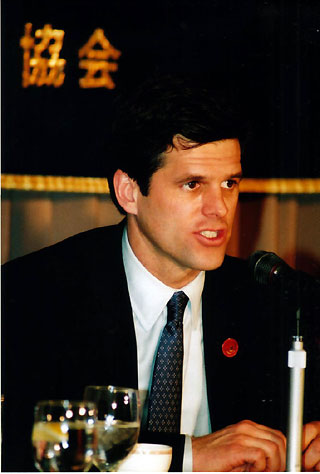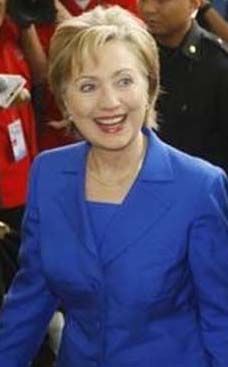
What is needed at the Peace Corps is a new director with the vision to create a revitalized organization for the 21st century. Of all the names bandied about, the best by far is Timothy Shriver, the CEO of Special Olympics International. Shriver has overseen a massive expansion of Special Olympics in precisely many of the countries where the Peace Corps serves. Sargent Shriver, Tim's father, was the first Peace Corps director, but his son would be anything but a sentimental choice. Indeed, he would be precisely the opposite of a legacy candidate. Shriver would not take the job unless it came with the mandate and power to rebuild the organization from the ground up. Shriver has proposed a "Department of Development and Service" to integrate the volunteers with USAID, the UN and NGOs. It is a bold vision if the Peace Corps doesn't end up the little guy carrying the coffee to the big meetings and driving the honchos around in a Land Rover. The genius of the Peace Corps is that it stands apart from the development establishment, and is the daring idea of sending individuals out to live among the people at their economic and social level. Each assignment is an experiment in which success or failure is largely based on the volunteer.
Laurence Leamer writes: The Tragedy of the Peace Corps
The Tragedy of the Peace Corps
by Laurence Leamer
Author of "Madness Under the Royal Palms: Love and Death Behind the Gates of Palm Beach"
Posted March 16, 2009 | 02:38 PM (EST)
Caption: Tim Shriver, President of the Special Olympics
For close to half a century the Peace Corps has suffered from a surfeit of easy admiration. President after president has praised the agency, vowed to expand its size or influence, and then left it largely alone, moving on to what were considered more crucial matters. Barack Obama is just the latest. During the presidential campaign, Obama promised to double the number of volunteers, but while planning to triple the number of domestic volunteers, the president has put forth a budget that at best will leave the Peace Corps at its current size.
The sad reality is that if Obama acts on his pledge, he will be presenting the Peace Corps bureaucracy with a problem it does not want and is probably incapable of handling. There are many talented, dedicated employees both in Washington and across the world, but there are too many barracks soldiers with neither the energy nor the ability to face the challenges of the world outside. At what should be the most promising moment for the organization in decades, the Peace Corps is at its most dangerous moment in its history.
The Peace Corps has too many easy political friends in Washington, satisfied with the organization the way it is, unwilling to spend their political time, energy and capital figuring out how to reinvigorate the agency for a new century. One of the problems is that there is a patronizing attitude toward the Peace Corps in the development community in Washington, and a willful dismissal of the important role the Peace Corps should play in a progressive foreign policy.
A case in point is The White House and the World: A Global Development Agenda for the Next U.S. President by The Center for Global Development, an important blueprint for the new administration. The book length document talks of building a foreign policy based on the three stools of diplomacy, defense and development. For all the talk of development, the Peace Corps is mentioned only once substantively almost as a historic relic as "part of the Cold War arsenal aimed both at stemming the spread of communism and at encouraging development in some of the world's poorest countries." The book talks nothing of a role for the Peace Corps as such but proposes a small global health corps.
The report notes: "The Americans' sense of moral obligation to people far away has grown as the international movement of goods, information, and people has accelerated." Nowhere, however, is there any acknowledgment of the role close to 200,000 Peace Corps volunteers have played in educating Americans about the rest of the world. Volunteers have gone on to plan seminal roles in everything from the Gates Foundation to the Foreign Service, and from heading innovative NGOs to developing businesses dealing with the developing world.
What is needed at the Peace Corps is a new director with the vision to create a revitalized organization for the 21st century. Of all the names bandied about, the best by far is Timothy Shriver, the CEO of Special Olympics International. Shriver has overseen a massive expansion of Special Olympics in precisely many of the countries where the Peace Corps serves. Sargent Shriver, Tim's father, was the first Peace Corps director, but his son would be anything but a sentimental choice. Indeed, he would be precisely the opposite of a legacy candidate. Shriver would not take the job unless it came with the mandate and power to rebuild the organization from the ground up.
Shriver has proposed a "Department of Development and Service" to integrate the volunteers with USAID, the UN and NGOs. It is a bold vision if the Peace Corps doesn't end up the little guy carrying the coffee to the big meetings and driving the honchos around in a Land Rover. The genius of the Peace Corps is that it stands apart from the development establishment, and is the daring idea of sending individuals out to live among the people at their economic and social level. Each assignment is an experiment in which success or failure is largely based on the volunteer.
The Peace Corps has been an important part of the American presence in the world for close to half a century, but now is the time for an even more crucial role. The Obama administration must reach out to the developing world with a strong, open hand in which one of the strong fingers is the Peace Corps or the handshake will be less than firm.












